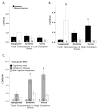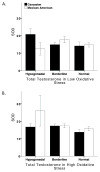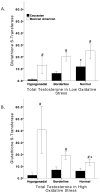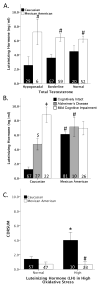Oxidative stress, testosterone, and cognition among Caucasian and Mexican-American men with and without Alzheimer's disease
- PMID: 24496073
- PMCID: PMC4219556
- DOI: 10.3233/JAD-131994
Oxidative stress, testosterone, and cognition among Caucasian and Mexican-American men with and without Alzheimer's disease
Abstract
Background: The use of testosterone among aging men has been increasing, but results from studies addressing the effectiveness of testosterone replacement therapy have been equivocal.
Objective: Given our prior pre-clinical studies that reported a major influence of oxidative stress on testosterone's neuroprotective effects, we investigated whether the negative effects of testosterone on brain function were predicted by oxidative load.
Methods: In order to test our hypothesis, we determined whether circulating total testosterone and luteinizing hormone correlated with cognition in a subset of the Texas Alzheimer's Research & Care Consortium (TARCC) cohort, consisting of Caucasian (n = 116) and Mexican-American (n = 117) men. We also assessed whether oxidative stress (as indexed by homocysteine levels) modified this relationship between sex hormones and cognition, and whether the levels of two antioxidants, superoxide dismutase-1 and glutathione S-transferase (GST), varied as a function of circulating testosterone.
Results: In a low oxidative stress environment, testosterone was positively associated with the level of the antioxidant, GST, while no deleterious effects on cognitive function were noted. In contrast, under conditions of high oxidative stress (homocysteine levels >12 μmol/L), testosterone and luteinizing hormone were associated with cognitive impairment, but only among Caucasians. The ethnic difference was attributed to significantly higher GST levels among Mexican-Americans.
Conclusion: While testosterone may be beneficial under conditions of low oxidative stress, testosterone appears to have negative consequences under conditions of elevated oxidative stress, but only in Caucasians. Mexican-Americans, however, were protected from any deleterious effects of testosterone, potentially due to higher levels of endogenous antioxidant defenses such as GST.
Keywords: Androgens; Mexican American; antioxidants; homocysteine; luteinizing hormone.
Conflict of interest statement
Figures





Similar articles
-
Peripheral oxidative stress biomarkers in mild cognitive impairment and Alzheimer's disease.J Alzheimers Dis. 2011;26(1):59-68. doi: 10.3233/JAD-2011-110284. J Alzheimers Dis. 2011. PMID: 21593563
-
Comorbid Depression and Diabetes as a Risk for Mild Cognitive Impairment and Alzheimer's Disease in Elderly Mexican Americans.J Alzheimers Dis. 2015;47(1):129-36. doi: 10.3233/JAD-142907. J Alzheimers Dis. 2015. PMID: 26402761
-
Relationships between testosterone levels and cognition in patients with Alzheimer disease and nondemented elderly men.J Geriatr Psychiatry Neurol. 2015 Mar;28(1):27-39. doi: 10.1177/0891988714541872. Epub 2014 Jul 9. J Geriatr Psychiatry Neurol. 2015. PMID: 25009157
-
Androgens in the etiology of Alzheimer's disease in aging men and possible therapeutic interventions.J Alzheimers Dis. 2007 Sep;12(2):129-42. doi: 10.3233/jad-2007-12202. J Alzheimers Dis. 2007. PMID: 17917157 Review.
-
An Updated Review: Androgens and Cognitive Impairment in Older Men.Front Endocrinol (Lausanne). 2020 Nov 13;11:586909. doi: 10.3389/fendo.2020.586909. eCollection 2020. Front Endocrinol (Lausanne). 2020. PMID: 33281745 Free PMC article. Review.
Cited by
-
Role of Estrogen and Other Sex Hormones in Brain Aging. Neuroprotection and DNA Repair.Front Aging Neurosci. 2017 Dec 22;9:430. doi: 10.3389/fnagi.2017.00430. eCollection 2017. Front Aging Neurosci. 2017. PMID: 29311911 Free PMC article.
-
Multiple Mechanisms Linking Type 2 Diabetes and Alzheimer's Disease: Testosterone as a Modifier.J Alzheimers Dis. 2017;59(2):445-466. doi: 10.3233/JAD-161259. J Alzheimers Dis. 2017. PMID: 28655134 Free PMC article. Review.
-
The Role of Lipid Rafts and Membrane Androgen Receptors in Androgen's Neurotoxic Effects.J Endocr Soc. 2022 Feb 21;6(5):bvac030. doi: 10.1210/jendso/bvac030. eCollection 2022 May 1. J Endocr Soc. 2022. PMID: 35308305 Free PMC article.
-
Oxidative Stress Biomarkers as Preclinical Markers of Mild Cognitive Impairment: The Impact of Age and Sex.J Pers Med. 2025 Apr 26;15(5):171. doi: 10.3390/jpm15050171. J Pers Med. 2025. PMID: 40423043 Free PMC article.
-
Testosterone deficiency, insulin-resistant obesity and cognitive function.Metab Brain Dis. 2015 Aug;30(4):853-76. doi: 10.1007/s11011-015-9655-3. Epub 2015 Feb 24. Metab Brain Dis. 2015. PMID: 25703239 Review.
References
-
- Krasnoff JB, Basaria S, Pencina MJ, Jasuja GK, Vasan RS, Ulloor J, Zhang A, Coviello A, Kelly-Hayes M, D’Agostino RB, Wolf PA, Bhasin S, Murabito JM. Free testosterone levels are associated with mobility limitation and physical performance in community-dwelling men: the Framingham Offspring Study. J Clin Endocrinol Metab. 2010;95:2790–2799. - PMC - PubMed
-
- Hyde Z, Flicker L, Almeida OP, Hankey GJ, McCaul KA, Chubb SA, Yeap BB. Low free testosterone predicts frailty in older men: the health in men study. J Clin Endocrinol Metab. 2010;95:3165–3172. - PubMed
-
- Tenover JL. Testosterone replacement therapy in older adult men. Int J Androl. 1999;22:300–306. - PubMed
-
- Morales A, Johnston B, Heaton JP, Lundie M. Testosterone supplementation for hypogonadal impotence: assessment of biochemical measures and therapeutic outcomes. J Urol. 1997;157:849–854. - PubMed
Publication types
MeSH terms
Substances
Grants and funding
LinkOut - more resources
Full Text Sources
Other Literature Sources
Medical
Research Materials

